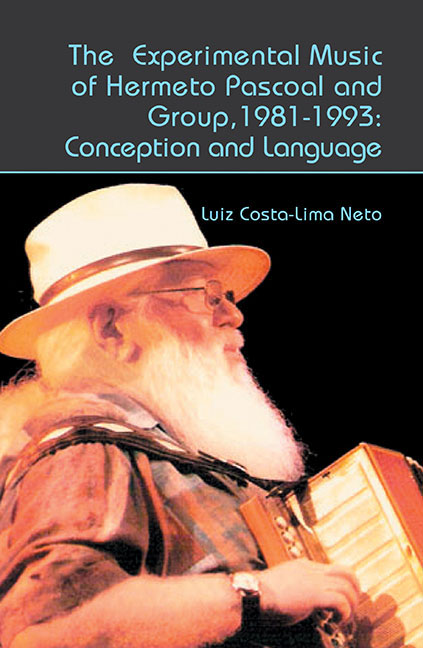Book contents
- Frontmatter
- Contents
- Miscellaneous Frontmatter
- Acknowledgments
- Introduction
- List of Illustrations
- Chapter 1 The conception and language of Hermeto Pascoal: first considerations
- Chapter 2 Bibliographic Discussion
- Chapter 3 The Creative Process Of Hermeto And Group
- Chapter 4 Reflections on Acoustics and Psycho-Acoustics
- Chapter 5 Selected Compositions For Analysis
- Conclusion
- Postscript
- Sources
- Plate section
Postscript
- Frontmatter
- Contents
- Miscellaneous Frontmatter
- Acknowledgments
- Introduction
- List of Illustrations
- Chapter 1 The conception and language of Hermeto Pascoal: first considerations
- Chapter 2 Bibliographic Discussion
- Chapter 3 The Creative Process Of Hermeto And Group
- Chapter 4 Reflections on Acoustics and Psycho-Acoustics
- Chapter 5 Selected Compositions For Analysis
- Conclusion
- Postscript
- Sources
- Plate section
Summary
A final interview with Hermeto Pascoal
On March 6, 1999, I conducted a final interview with Hermeto, to ascertain some of the conclusions I had reached in my research, as well as to complement certain data and biographical information collected in my interviews with the musicians or through research in biographical material published in the press. I shall discuss only some of the passages of that interview in order to conclude my study, in order to cast some light on and/or complement aspects that I have previously discussed with regard to Hermeto's trajectory and, especially, to his musical conception and language.
I will start with the somewhat controversial aspect of Hermeto being an autodidact. In this interview with him I mentioned that my initial perplexity or even incredulity regarding his autodidactic trajectory was shared by many. It is interesting to observe how Hermeto dealt with that comment:
Everybody in the whole world hails me as an autodidactic multi-instrumentalist, and I saw that there were people who did not believe that. That I might have a teacher. It was at that time (when he was approximately 40 years old) that I felt like an orphan. Because I think it's so cool to say … heck, if I'd learnt from a teacher or at a school, it would give me the greatest pleasure to say so, and I sure tried (…) Sometimes the father is an outlaw and the son grows up and wants to meet his father. Well, even if my music teacher were an outlaw I'd like to meet him (…) So I'd always say that with my name in the papers all the time, who wouldn't like to be my teacher, to come up and say I'm lying, say that he had taught me something?
(Hermeto)Hermeto is right: he became an autodidact because his visual deficiency discouraged his teachers. If, on the one hand, his own development is a natural source of pride for him, on the other hand it creates problems with people who do not believe him; in a way that is painful to him because his trajectory was victorious but also lonely.
- Type
- Chapter
- Information
- The Experimental Music of Hermeto Pascoal and Group, 1981–1993Conception and Language, pp. 147 - 152Publisher: Boydell & BrewerPrint publication year: 2015



